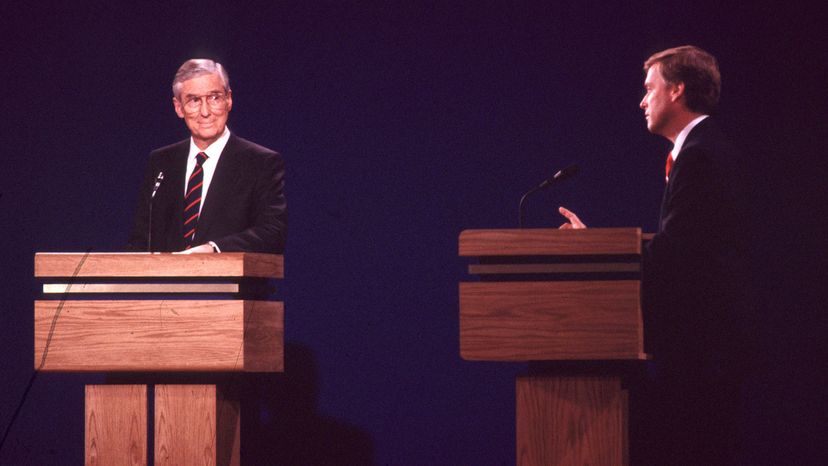Presidential Debates: Who Wins?

Debates are meant to be about candidates' views on the issues, and no response is incorrect. So, if there's no right or wrong answers in a debate, how can one candidate emerge a winner?
The results of debates are all about perception. There are the perceptions of the national news anchors, who serve as commentators by telling viewers what to expect beforehand and then dissecting what was said afterward. There's also the perception of the media, who write about the debate. What commentators and reporters choose to discuss can help shape the minds of the voting public — the group whose opinion matters the most in determining the winner of a debate.
Advertisement
Sometimes, the candidates make it obvious who's lost. President George H.W. Bush made it an easy call when he checked his watch several times during a town hall debate in the 1992 election [source: Zelizer]. In the 2004 debates between Senator John Kerry and President George W. Bush, the television networks ignored the memorandum of understanding and filmed reaction shots. They caught Bush looking annoyed during breakaway shots, which occur when the camera switches from the candidate speaking to the one who's not [source: AP].
The winner of a debate can become equally clear — sometimes just through a mere turn of phrase. When Senator Dan Quayle compared himself to President John F. Kennedy in a 1988 vice-presidential debate, Sen. Lloyd Bentsen pounced on him. "Senator, I served with Jack Kennedy. I knew Jack Kennedy. Jack Kennedy was a friend of mine. Senator, you're no Jack Kennedy" [source: National Public Radio]. When President Ronald Reagan's age became an issue of discussion in a 1984 debate, he turned the tables, saying, "I want you to know that also I will not make age an issue of this campaign. I am not going to exploit, for political purposes, my opponent's youth and inexperience."
In 2012, Republican nominee Mitt Romney appeared out of touch with women's rights when asked to address pay equity and he made this boast, "I had the chance to pull together a Cabinet, and all of the applicants seemed to be men ... I went to a number of women's groups and said, 'Can you help us find folks?' and they bought us whole binders full of women." The phrase "binders full of women" quickly became a joke at his expense [source: Cunningham].
Ultimately, what matters is who the public thinks won a debate. Polling companies have made an industry of keeping track of what voters think. As soon as a debate ends, polling companies and media agencies have employees on the phone calling registered voters to ask them what they thought of the debate. Within hours, polls are released and the winners are clear. The results can come more quickly through snap polling, where voters go to the pollsters via the internet.
The veracity of post-debate polls in accurately pinning down voter sentiment can be hit or miss. While polls almost across the board showed Kerry as the winner of the three presidential debates in 2004, George W. Bush won reelection [source: CNN]. In 2016, Hillary Clinton soundly trounced Donald Trump in all three presidential debates, according to Gallup, yet Donald Trump triumphed on Election Day [source: Gallup]. Snap polls are often contested since they require a level of tech-savvy and therefore represent younger segments of the voting population rather than the voting public as a whole. The very presence of polls can also affect voter sentiment. Polls released showing a clear winner from a debate can affect the perception of the outcome of a debate, influencing voter perception.
The advent of snap polls has inspired a resurgence of technology in presidential debates. For the first time since 1960, technology would begin to play a major role in shaping the political process in the 2008 election.